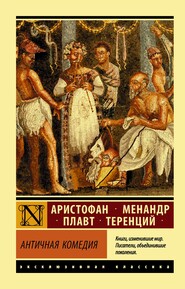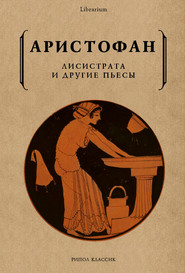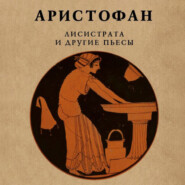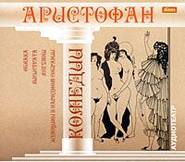По всем вопросам обращайтесь на: info@litportal.ru
(©) 2003-2024.
✖
The Eleven Comedies, Volume 1
Автор
Год написания книги
2018
Настройки чтения
Размер шрифта
Высота строк
Поля
STREPSIADES. What are you saying now? Who causes the rain to fall? Answer me that!
SOCRATES. Why, 'tis these, and I will prove it. Have you ever seen it raining without clouds? Let Zeus then cause rain with a clear sky and without their presence!
STREPSIADES. By Apollo! that is powerfully argued! For my own part, I always thought it was Zeus pissing into a sieve. But tell me, who is it makes the thunder, which I so much dread?
SOCRATES. 'Tis these, when they roll one over the other.
STREPSIADES. But how can that be? you most daring among men!
SOCRATES. Being full of water, and forced to move along, they are of necessity precipitated in rain, being fully distended with moisture from the regions where they have been floating; hence they bump each other heavily and burst with great noise.
STREPSIADES. But is it not Zeus who forces them to move?
SOCRATES. Not at all; 'tis aerial Whirlwind.
STREPSIADES. The Whirlwind! ah! I did not know that. So Zeus, it seems, has no existence, and 'tis the Whirlwind that reigns in his stead? But you have not yet told me what makes the roll of the thunder?
SOCRATES. Have you not understood me then? I tell you, that the Clouds, when full of rain, bump against one another, and that, being inordinately swollen out, they burst with a great noise.
STREPSIADES. How can you make me credit that?
SOCRATES. Take yourself as an example. When you have heartily gorged on stew at the Panathenaea, you get throes of stomach-ache and then suddenly your belly resounds with prolonged growling.
STREPSIADES. Yes, yes, by Apollo! I suffer, I get colic, then the stew sets a-growling like thunder and finally bursts forth with a terrific noise. At first, 'tis but a little gurgling pappax, pappax! then it increases, papapappax! and when I seek relief, why, 'tis thunder indeed, papapappax! pappax!! papapappax!!! just like the clouds.
SOCRATES. Well then, reflect what a noise is produced by your belly, which is but small. Shall not the air, which is boundless, produce these mighty claps of thunder?
STREPSIADES. But tell me this. Whence comes the lightning, the dazzling flame, which at times consumes the man it strikes, at others hardly singes him. Is it not plain, that 'tis Zeus hurling it at the perjurers?
SOCRATES. Out upon the fool! the driveller! he still savours of the golden age! If Zeus strikes at the perjurers, why has he not blasted Simon, Cleonymus and Theorus?[512 - These three men have already been referred to.] Of a surety, greater perjurers cannot exist. No, he strikes his own Temple, and Sunium, the promontory of Athens,[513 - A promontory of Attica (the modern Cape Colonna) about fifty miles from the Piraeus. Here stood a magnificent Temple, dedicated to Athené.] and the towering oaks. Now, why should he do that? An oak is no perjurer.
STREPSIADES. I cannot tell, but it seems to me well argued. What is the thunder then?
SOCRATES. When a dry wind ascends to the Clouds and gets shut into them, it blows them out like a bladder; finally, being too confined, it bursts them, escapes with fierce violence and a roar to flash into flame by reason of its own impetuosity.
STREPSIADES. Forsooth, 'tis just what happened to me one day. 'Twas at the feast of Zeus! I was cooking a sow's belly for my family and I had forgotten to slit it open. It swelled out and, suddenly bursting, discharged itself right into my eyes and burnt my face.
CHORUS. Oh, mortal! you, who desire to instruct yourself in our great wisdom, the Athenians, the Greeks will envy you your good fortune. Only you must have the memory and ardour for study, you must know how to stand the tests, hold your own, go forward without feeling fatigue, caring but little for food, abstaining from wine, gymnastic exercises and other similar follies, in fact, you must believe as every man of intellect should, that the greatest of all blessings is to live and think more clearly than the vulgar herd, to shine in the contests of words.
STREPSIADES. If it be a question of hardiness for labour, of spending whole nights at work, of living sparingly, of fighting my stomach and only eating chick-pease, rest assured, I am as hard as an anvil.
SOCRATES. Henceforward, following our example, you will recognize no other gods but Chaos, the Clouds and the Tongue, these three alone.
STREPSIADES. I would not speak to the others, even if I should meet them in the street; not a single sacrifice, not a libation, not a grain of incense for them!
CHORUS. Tell us boldly then what you want of us; you cannot fail to succeed, if you honour and revere us and if you are resolved to become a clever man.
STREPSIADES. Oh, sovereign goddesses, 'tis but a very small favour that I ask of you; grant that I may distance all the Greeks by a hundred stadia in the art of speaking.
CHORUS. We grant you this, and henceforward no eloquence shall more often succeed with the people than your own.
STREPSIADES. May the god shield me from possessing great eloquence! 'Tis not what I want. I want to be able to turn bad lawsuits to my own advantage and to slip through the fingers of my creditors.
CHORUS. It shall be as you wish, for your ambitions are modest. Commit yourself fearlessly to our ministers, the sophists.
STREPSIADES. This will I do, for I trust in you. Moreover there is no drawing back, what with these cursed horses and this marriage, which has eaten up my vitals. So let them do with me as they will; I yield my body to them. Come blows, come hunger, thirst, heat or cold, little matters it to me; they may flay me, if I only escape my debts, if only I win the reputation of being a bold rascal, a fine speaker, impudent, shameless, a braggart, and adept at stringing lies, an old stager at quibbles, a complete table of the laws, a thorough rattle, a fox to slip through any hole; supple as a leathern strap, slippery as an eel, an artful fellow, a blusterer, a villain; a knave with a hundred faces, cunning, intolerable, a gluttonous dog. With such epithets do I seek to be greeted; on these terms, they can treat me as they choose, and, if they wish, by Demeter! they can turn me into sausages and serve me up to the philosophers.
CHORUS. Here have we a bold and well-disposed pupil indeed. When we shall have taught you, your glory among the mortals will reach even to the skies.
STREPSIADES. Wherein will that profit me?
CHORUS. You will pass your whole life among us and will be the most envied of men.
STREPSIADES. Shall I really ever see such happiness?
CHORUS. Clients will be everlastingly besieging your door in crowds, burning to get at you, to explain their business to you and to consult you about their suits, which, in return for your ability, will bring you in great sums. But, Socrates, begin the lessons you want to teach this old man; rouse his mind, try the strength of his intelligence.
SOCRATES. Come, tell me the kind of mind you have; 'tis important I know this, that I may order my batteries against you in a new fashion.
STREPSIADES. Eh, what! in the name of the gods, are you purposing to assault me then?
SOCRATES. No. I only wish to ask you some questions. Have you any memory?
STREPSIADES. That depends: if anything is owed me, my memory is excellent, but if I owe, alas! I have none whatever.
SOCRATES. Have you a natural gift for speaking?
STREPSIADES. For speaking, no; for cheating, yes.
SOCRATES. How will you be able to learn then?
STREPSIADES. Very easily, have no fear.
SOCRATES. Thus, when I throw forth some philosophical thought anent things celestial, you will seize it in its very flight?
STREPSIADES. Then I am to snap up wisdom much as a dog snaps up a morsel?
SOCRATES. Oh! the ignoramus! the barbarian! I greatly fear, old man, 'twill be needful for me to have recourse to blows. Now, let me hear what you do when you are beaten.
STREPSIADES. I receive the blow, then wait a moment, take my witnesses and finally summon my assailant at law.
SOCRATES. Come, take off your cloak.
STREPSIADES. Have I robbed you of anything?
SOCRATES. No, but 'tis usual to enter the school without your cloak.
STREPSIADES. But I am not come here to look for stolen goods.











